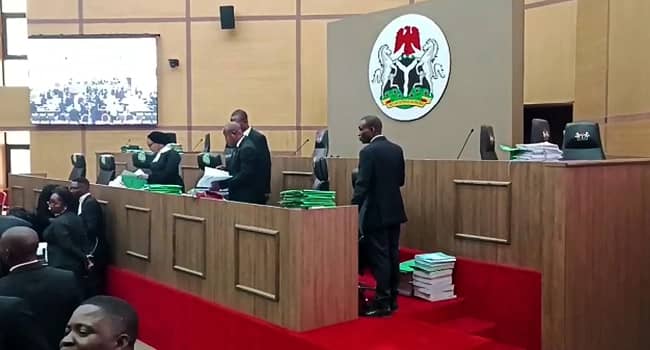News
UPDATE: Supreme Court Consolidates Suits By 10 States On Naira Scarcity

Expectations are high as the Supreme Court consolidated the suit on Wednesday and Nigerians expect a major and definitive decision by the apex court.
The Supreme Court on Wednesday consolidated the suits instituted by the 10 state governments against the Federal Government challenging the implementation of the naira redesign.
At the last hearing on February 15, seven states joined the three initial states as co-plaintiffs, while Edo and Bayelsa states joined the Federal Government as co-defendants.
Expectations are high as the Supreme Court consolidated the suit on Wednesday.
The court, however, refused to join Abia State in the suit on the ground that it came late with its originating summons.
All efforts by Abia State Government to be joined in the suit, was turned down and was ordered to present its case at a later date.
A motion for the consolidation was also argued by the Counsel for Rivers State, Emmanuel Ukala.
Moving the motion on notice, Ukala premised the consolidation request on the need for the suit to be heard without any hinderance since the matter bothers on same issue.
The head of the 7-man panel, Justice John Okoro, granted the request and ordered consolidation of the ten suits into one.
Now, the plaintiffs in the suit are the Attorneys General (AGs) of Kaduna, Kogi, Zamfara, Ondo, Ekiti, Katsina, Ogun, Cross River, Sokoto, and Lagos states while the defendants are the Attorney General of the Federation, Abubakar Malami (SAN), as well as the AGs of Bayelsa and Edo states.
Commencing arguments, counsel for the Federal Government, Kanu Agabi, said the Supreme Court held that all reliefs are rooted in section 20 of the CBN Act, therefore, the apex court has no jurisdiction to hear the suit as the action cannot commence with an Originating Summons
He wondered why the plaintiffs did not bring the CBN governor to court as a respondent, after making reference to him 32 times in their Originating Summons.
He said the reliefs are against the CBN, yet they didn’t deem it fit to bring the CBN into the matter. He added that Nigerians had already began rejecting the old notes way before the President’s directive. He insisted that the President is not in violation of the Supreme Court order as under the constitution, the President is empowered to veto any legislation.
BACKGROUND STORY
The Central Bank of Nigeria (CBN) had extended the deadline for the swap of old N200, N500, and N1,000 from January 31 to February 10 following complaints by many Nigerians but the Supreme Court, after a suit filed by the states, held that the Federal Government, the CBN, commercial banks must not continue with the February 10 deadline pending the determination of a notice in respect of the issue on February 22.
However, President Muhammadu Buhari, in a national broadcast last Thursday, directed the apex bank to release old N200 notes into circulation to co-exist with new N200, N500 and N1,000 banknotes for 60 days — by April 10, 2023. He also said old N500 and N1,000 banknotes cease to be legal tender in Nigeria
There has been a flurry of reactions and stark criticisms against the President’s directive including from governors of his party, the All Progressives Congress (APC).
Governors Nasir El-Rufai (Kaduna), Abubakar Badaru (Jigawa), Rotimi Akeredolu (Ondo), Umar Ganduje (Kano); Speaker of the House of Representatives, Femi Gbajabiamila; Minister of State for Labour and Employment, Festus Keyamo; and many stalwarts of the ruling APC have openly censured and faulted the President’s directive, arguing that it has not grounds because the case is before the apex court.
Leading Senior Advocates of Nigeria like Femi Falana and Mike Ozekhome have equally faulted the President’s move, saying he cannot overrule the apex court of the land.
Also, three State Governors- Kaduna, Zamfara and Kogi have filed another suit against Malami, and the CBN Governor, Godwin Emefiele over contempt of court and their alleged failure to comply with the Supreme Court order on the old naira notes.
More to follow…
-
Society News3 years ago
Jamaican man beheads wife after finding out their 6 kids are not his
-
Society News5 years ago
EXCLUSIVE: The Complete Story of Dolapo Awosika, John Fashanu and Prophet Kasali Sex Mess
-
News2 years ago
Breaking: Ex-Police IG, Tafa Balogun Dies
-
News4 years ago
Pastor Osagie Ize-Iyamu, His Membership Of Secret Cult, And Other Issues Touching On His Public Credentials Examined by Barr. PATRICK I. BIOSE
-
News4 years ago
BREAKING: Ajimobi’s daughter-in-law blast Gov. Makinde, says gov can’t surpass ex-Oyo gov
-
News4 years ago
BREAKING: 2 arrested as NAF begins investigations into Tolulope’s death
-
News4 years ago
BREAKING: Police take over Edo House of Assembly as APC, Oshiomhole move to seize control
-
Crime4 years ago
Exclusive: Female Aide Fingered In Oko Oloyun’s Murder + Banking Transactions That Nailed Husband
Notice: Undefined variable: user_ID in /var/www/first2023/wp-content/themes/firstweekly/comments.php on line 48
You must be logged in to post a comment Login